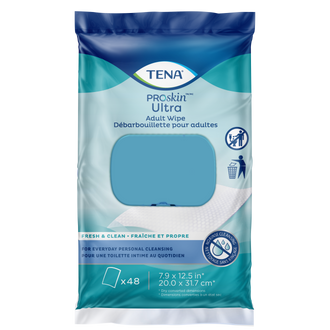Sep 30, 2024
Noticing a shift in your natural scent? Don't worry—Menopause can bring many changes, including body odor.1 If you're noticing that you’re smelling different, or just preparing for menopause, we’re here to help.
Hormone changes, especially estrogen, can affect how you smell.2
But don’t worry—understanding why this happens and how to manage it can help. We’ll break down the science behind these changes and share tips to keep you feeling fresh and confident.
Why Does Body Odor Change During Menopause?
As you navigate through menopause, you might notice unexpected changes in your body odor.1 This can be surprising, but it’s a common part of the menopausal transition. The primary culprit behind this shift is the drop in estrogen levels that occurs during menopause.2 This, combined with hot flashes and night sweats can cause excessive sweating and changes in body odor.1
As a result, these changes can make your body odor more noticeable or different from what you’re used to.2 While this change in body odor can be startling, it’s entirely normal and often these slight odor changes are temporary.2 Understanding this connection can help you feel more prepared and less concerned about these changes.
Hot Flashes & Night Sweats
Hot flashes and night sweats are common symptoms of menopause that can significantly affect your body odor.2 Understanding the physiological process behind these symptoms can help explain why they lead to increased sweating and, consequently, stronger body odor.
Estrogen plays a key role in regulating your body’s blood vessel elasticity.2 When estrogen levels drop, your blood vessels don’t expand as effectively, making it harder for your body to release excess heat.2 This can lead to more frequent hot flashes and night sweats, which, as you might guess, can increase body odor.2
Low Estrogen Levels
Low estrogen levels are a central aspect of the menopausal transition and impacts various bodily functions, including how you smell.2
When estrogen levels drop during menopause, it can affect vaginal and body odor.2 Estrogen helps keep the vulvar and vaginal tissues naturally lubricated, so, when estrogen drops, you also lose some of that natural lubrication.2
This change can affect the vaginal pH and alter the balance of bacteria.2 You might see a drop in Lactobacilli, which are the “good bacteria” that help keep things healthy.2 With less Lactobacilli, other types of bacteria can start to grow, which might change the scent and discharge you’re used to.2
Stress & Anxiety
About 25% of menopausal women will experience anxiety, and those with more severe symptoms are likely to face higher levels of anxiety.2
Regular sweat is released from eccrine sweat glands, whereas stress and anxiety trigger the apocrine glands.2 These glands contain more fats and proteins compared to other sweat gland types and can negatively affect odor.2 The stress hormone cortisol also plays a significant role in this process, further worsening the effects of increased sweating and body odor.2
If you’re feeling more anxious during menopause, don’t be surprised if your sweat starts to smell a bit different.2
Changed Sense of Smell
During menopause, some women find that their sense of smell also changes.2 This can make body odors seem stronger or different from what you're used to. It’s important to remember that changes in smell are a normal part of aging, and while it might feel a bit unsettling at first, it’s all part of the process.2
More Urine Leaks
During menopause, weakened pelvic muscles and urinary incontinence can become more common, leading to frequent urine leaks.2 These leaks can affect body odor, especially if not managed right away because urine can leave a lingering smell if it comes into contact with your clothing or skin, adding to body odor issues.
To help manage this, consider using TENA’s range of incontinence pads and liners. They’re designed to offer effective protection against odor and wetness and keep you feeling fresh throughout the day. These products will help you handle leaks more efficiently and minimize their impact on body odor.
Read > Urge Urinary Incontinence and Bladder Spasm for more information on managing these symptoms effectively.
Diet Changes
As you go through menopause, you might notice shifts in your taste preferences or make intentional changes to your diet. These dietary changes can have an impact on body odor. Certain foods are known to influence how you smell, so it’s helpful to be aware of their effects.1
Foods high in sulfur can lead to a more noticeable body odor.1 When your body processes these foods, the sulfur can be released through your sweat, resulting in an unpleasant odor.1 Examples of sulfur-rich foods include:
- Onions1
- Garlic1
- Red meat1
Additionally, some foods and drinks can increase sweating, which in turn can intensify body odor.1 While these foods don't directly cause body odor, they can contribute to it by affecting how much you sweat1:
- Caffeine1
- Spicy foods1
- Alcohol1
Being mindful of these foods and drinks and knowing how they might be affecting your body odor can help you make dietary choices that keep you feeling fresh and confident.
Dehydration
During menopause, dehydration can become more common, largely due to frequent night sweats.2 When you lose excess fluids through sweating and don't replace them adequately, it can lead to a more concentrated urine, which often results in a stronger, more noticeable body odor.2
Tips to Stay Hydrated:
- Drink Water Regularly: Aim for at least 9 cups of water a day. Increase intake if you experience frequent sweating because of exercise or weather.3
- Include Hydrating Foods: Incorporate fruits and vegetables with high water content, such as cucumbers or watermelon.1
- Monitor Fluid Loss: If you’re sweating a lot, consider electrolyte-rich beverages to help replenish the ones you lost.1
4 Ways Menopause Affects Body Odor
Here’s how menopause affects body odor in different areas of your body and what you can do about it:
Groin Area
With changing estrogen levels and more sweating during menopause, you might notice a stronger smell in the groin area.1,2
Tips to Keep Fresh:
- Stay Clean: Wash the area regularly with a gentle regular antibacterial soap to keep things fresh.2
- Avoid Douching: Using douches, special washes, and sprays can create more problems over time, such as recurring infections or stronger odors.2 This is because these products can disrupt the balance of healthy bacteria in the vaginal canal that are essential for maintaining vaginal health.2
- Stay Dry: Consider using antiperspirants made for sensitive areas to absorb excess moisture.2
Breasts
Sweating under the breasts can become more noticeable, especially during hot flashes. The warmth and moisture can lead to a stronger odor.
How to Manage It:
- Keep It Clean: Make sure to wash and dry the area thoroughly each day.2
- Choose breathable clothes: Look for bras that help keep the area dry and comfortable.1
- Use Antiperspirants: Applying a gentle antiperspirant can help control sweating. 2
Feet
Hormonal changes can affect how much your feet sweat, which might lead to increased foot odor. Sweat can mix with bacteria, causing a stronger smell.
Foot Care Tips:
- Wear Breathable Shoes: Choose shoes that allow air to circulate, helping to keep your feet dry.
- Keep Feet Dry: Wash your feet daily, dry them well, and change your socks often.4
Underarms
Your underarms are often the most noticeable spot for body odor because of the high number of apocrine sweat glands.1 Menopause can make managing this area a bit more challenging.
Tips for Fresh Underarms:
- Pick the Right Deodorant: Use deodorants or antiperspirants that offer strong odor control.2
- Wear Breathable or loose-fitting Fabrics: Clothes made from natural fibers like cotton help with air circulation.1
- Stay Prepared: Apply deodorant on at the start of the day as well as when you notice any odor changes to stay fresh throughout the day.2
By focusing on these areas and using these tips, you can handle the changes in body odor during menopause with confidence.
How to Treat Menopause-Related Body Odor
Managing body odor during menopause can feel challenging, but there are several easy strategies you can use to keep things under control. Here’s how to make these changes part of your daily routine:
Stay Cool at Night
Night sweats can disrupt your sleep and increase body odor. To help reduce these sweats:
- Sleep in a Cool Environment: Keep your bedroom well-ventilated and set the thermostat to a cooler temperature.
- Use Breathable Bedding: Choose lightweight, moisture-wicking sheets and blankets that help keep you cool.
- Wear Moisture-Wicking Clothing: Choose pajamas made from breathable materials designed to wick away sweat and keep you dry.1
Switch to Gentle-Soap Washes
Special washes and sprays soaps can strip your skin of the natural good bacteria, potentially leading to stronger odors.2 Instead:
- Use Gentle Cleansers: Opt for gentle, soap cleansers that maintain the skin’s natural balance and help keep odor at bay.4
Choose Odor-Fighting Clothes
Some clothing options are designed specifically to tackle odor:
- Odor-Fighting Fabrics: Look for clothes made with antimicrobial or moisture-wicking technology that helps prevent odor and keeps you feeling fresh throughout the day.1
- Choose Cotton: Cotton and other natural fabrics allow your skin to breathe and help reduce sweating, which can help manage odor more effectively.1
By incorporating these simple strategies into your daily routine, you can effectively manage menopause-related body odor and feel more comfortable and confident.
References
1. Cleveland Clinic. ‘Body Odor’. 3 April 2022. Accessed 19 August 2024. Available from: https://my.clevelandclinic.org/health/symptoms/17865-body-odor
2. Healthline. ‘Is There a Relationship Between Menopause and Body Odor?’. 20 February 2024. Accessed 19 August 2024. Available from: https://www.healthline.com/health/menopause-body-odor#takeaway
3. Healthline. ‘How Much Water You Need to Drink’. 22 September 2021. Accessed 29 August 2024. Available from: https://www.healthline.com/health/how-much-water-should-I-drink
4. MedicalNewsToday. ‘What to know about body odor’. 24 April 2024. Accessed 19 August 2024. Available from: https://www.medicalnewstoday.com/articles/173478
5. Cleveland Clinic. ‘Perimenopause’. 8 August 2024. Accessed 19 August 2024. Available from: https://my.clevelandclinic.org/health/diseases/21608-perimenopause







